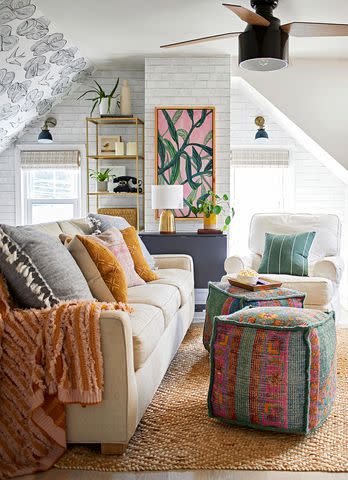No, a Den Isn’t Exactly the Same Thing as a Living Room or Family Room
Dens have their own definitions and purposes, technically. Learn what to expect when you see a den mentioned in a property listing.

You might have a room in your home that you refer to as a den, but did you know the term has a formal, official meaning when it appears in real estate listings? Just as there’s a technical difference between a family room and a living room, a den—formally speaking—has a distinct purpose in the home.
“A den is a second living space that can work as a family room or home office,” says Stayce Mayfield, a principal agent with Redfin.
Of course, there’s a bit more to it than that, including where the room typically appears in a home’s layout and what is required for it to officially be considered a den. With help from the experts, we’ll explore everything you need to know about a den, whether you’re considering a property with a den or wondering if you can highlight the presence of a den in your own home in your listing.
:
What Is a Den?
A den is a room typically used as a secondary living space or office. It is often a smaller, cozier room than the primary living space and can function as a library, home movie theater, or any number of other recreation spaces. The name comes from bear dens, which provide shelter to hibernating bears in winter (hence the emphasis on coziness in many uses of a den). Dens are their own rooms, clearly delineated by walls—you won’t often see dens as part of an open-concept floor plan.
The room itself must have both a window and heating and cooling to be considered a den, according to Mayfield, though technical or legal requirements may vary by locale. (Some people might even argue that the absence of a window makes the room cozier.)
“It's meant to be separate and sovereign from living and dining rooms and, traditionally, media rooms,” says Frances Katzen of Douglas Elliman. Unlike with bedrooms, there are no formal requirements for dens in New York City—the term is more descriptive than anything else, and dens (and most living spaces) aren’t subject to the same kind of legal requirements that bedrooms are.
Minette Schwartz of Compass in Miami agrees that dens aren’t typically formally defined in her region. In both of these areas, you won’t necessarily see a den listed in the properly layout or description in MLS, but photos and your tour of the home will show a sort of bonus room used by different owners for various things.
Schwartz points out that dens offer a unique layout solution in homes.
“For new homes, dens are a way to minimize corridors or hallways,” she says. “So for the second floor, you would enter an open space with a lounge area or tv room and each bedroom would be connected—by door—to the den. Historically, you would climb stairs and enter a labyrinth of hallways to get to bedrooms [instead].”

Whether it doubles as a transitional room or is simply a secondary living space, dens are becoming more common.
“Dens have become more and more popular,” Mayfield says. “I didn't grow up in a house that had a den, but I feel it’s a great addition, as it allows for more space, and when you have guests over, they tend to sit in the formal living room. It’s nice to have the extra room.”
:
How Do Dens Hurt or Help Property Listings?
Like any kind of bonus room, a den is added space that is certain to boost your home’s resale potential. In some cases, a small den might not be a major bonus if it compromises space you might have otherwise enjoyed as part of the living or dining room, for example. But most homes with a layout that includes a den have plenty of room to spare.
“People will even look at it as an additional bedroom, pending the home layout,” Mayfield says.
To boost appeal, the room can be staged to show potential buyers how they might use the space.
“It can be staged as many things: family room with a comfortable couch or sofa, TV area, game room, play room for kids, office space, art studio, music room, etc.,” Mayfield says. “Anything your heart desires.”
Schwartz suggests a home gym or yoga studio as other potential uses for a den. In today’s work-from-home age, presenting a den as a home office could be a major selling point.
“People want space to themselves and crave privacy, so a den offers another place for that—it offers a blank slate to compensate for lost function elsewhere in the home,” Katzen says.
:

